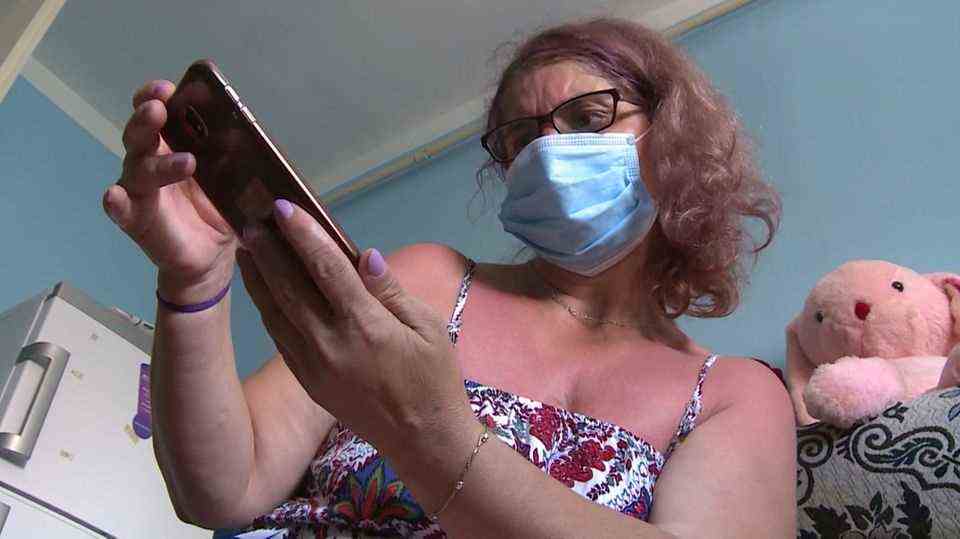ARD documentary
The Tönnies system is still running
In the past few years trade union representatives and activists have repeatedly demonstrated for better working conditions and fair wages at Tönnies (archive photo).
© Friso Gentsch / DPA
The corona outbreak at the Tönnies plant in June 2020 turned many people’s attention to the working conditions in slaughterhouses. Tönnies promised improvement. An ARD documentary now shows: not much has changed since then.
“We will change this industry,” announced meat producer Clemens Tönnies cockily at a press conference in June 2020. Tönnies was under pressure at the time. Almost 1,400 employees of the company, most of them employed by subcontractors, had contracted the coronavirus. The largest slaughterhouse in Germany was completely shut down for four weeks, almost 7,000 people had to be quarantined, and the Gütersloh district became a high-risk area.
The living and working conditions of the factory workers came into the public eye. And it quickly became clear: the Tönnies system works through wage dumping, constant monitoring and sometimes unworthy working conditions. All of this should come to an end – that was the promise made by Clemens Tönnies.
But has the meat industrialist kept his word? Barely a year and a half after the remarkable press conference, the answer is sobering. Because a documentation of the ARD shows: Not too much has changed in the Tönnies house.
Tönnies is still working with subcontractors
The sharpest criticism in the past year was the employment of production workers by subcontractors. This made it possible to bypass German standards such as the applicable minimum wage. Most of the workers from Eastern Europe received significantly less wages than is usual in Germany. According to Tönnies, something has actually happened here. The employees are now employed in the Tönnies company, there are no more subcontractors and dodgy work contracts.
As for the work in his slaughterhouse, I think that’s true. However, the company owner himself admits that his company still works with subcontractors, for example to recruit workers in Eastern European countries, to transport them to Germany, to train them and to control their living spaces.
“Who is more dependent?”
While the slaughterhouse hit the headlines in the summer of 2020, a description of the situation of the mostly unskilled workers from Romania, Bulgaria or Poland made the rounds: Dependency. The ARD documentary also shows that many Eastern Europeans are lured to Germany with great promises: a lot of salary, cheap accommodation, regular working hours.
It is not immediately apparent to some that they have to pay for many of these things. For the subcontractors with whom Tönnies still works, the workers are above all a business. They offer overpriced transports in scrap-ripe cars, and charge rents that are higher than actually agreed. Most accept this. The language barrier often prevents people from looking after an apartment or opening an account on their own. The subcontractors take advantage of this dependency.

On the other hand, it is also the Tönnies company, which is dependent on the subcontractors, according to the report. The slaughterhouse could lose thousands of Eastern European workers with just one entrepreneur named in the film. Not a good prospect when you have such a great need for cheap labor.
Clemens Tönnies emphasizes: “The question is justified: Who is actually more dependent?” He just needed this link. “We just have a time factor that we need to change.” However, Tönnies does not reveal how big this time factor is.
Trapped in your own system
What remains is an ambivalent balance. In June 2020, Tönnies promised nothing less than a revolution in its entire industry. A year and a half after this announcement, one or two things in his company have actually changed for the better – but a lot has stayed the same.
The Tönnies company looks as if it is about to reach the “discontinued model” brand. For decades, Clemens Tönnies built a company that focused on quantity. More than 20,000 pigs are still slaughtered every day at the main plant in Rheda-Wiedenbrück. The international market was flooded with meat from Tönnies and other large butchers of this size. Now times have changed.
Many customers pay attention to the origin of the meat they buy and distance themselves from factory farming and large slaughterhouses. Discounters like Aldi even want to say goodbye completely to fresh meat from conventional farming in the coming years.
This would mean that a company like Tönnies, which was always geared towards the masses, would be trapped in the system that Managing Director Clemens himself created.
Source: ARD documentary: “The slaughter factory – How Tönnies fights for its reputation, Southgerman newspaper, Editorial network Germany, Tönnies press conference, WDR

